This review is going to depart slightly from the Outsider norm somewhat simply due to my past and present relationship with the filmmaker, Christopher Monger, and the film itself. This is a review of the DVD in the new BFI Blu-ray/DVD release of Chris's Voice Over. I first saw this movie almost 30 years ago and up until now, it virtually disappeared. I'll spice up the review with extracts from Chris's own introduction to the film, some of which didn't make it into the BFI's Blu-ray sleeve notes. And secondly in a separate article, I'll briefly examine the artistic ambitions of one of Chris' first features (the Extra on this disc) Repeater by way of an admittedly very biased, personal look at what I ignorantly and grossly interpret as 'art' cinema. I'll also stress how bloody important it is to have a sympathetic 'godfather' to help you to get into this frequently odd and mostly insane business. That may come as a surprise to Chris but he really was the very first real filmmaker I got to know and his generosity and support were crucial to me as I was venturing into unknown, sprocket-dotted waters. It's a great credit to the BFI for recognising a fledgling film-maker's work, releasing it on the DVD/Blu-ray format and a double thrill for me as Chris is an artist who just happened to have crossed paths with my own in many delightful and inspiring ways.
When Chris was at art school...
"The only other person with similar artistic ambitions was a rather rotund fellow: Ian McNeice. He was already a fine actor, so much so that the school plays revolved around him, and reviewers came from as far away as Bristol to see this young chump. We became inseparable, a double act around the coffee bars of Taunton."
Monger & McNeice – now there's a buddy cop movie title. And so began a director/actor relationship that I suspect nurtured and nudged both parties down a solid and dare I say respectable career path. Playing Winston Churchill in the finale of Matt Smith's second Doctor Who series, McNeice is still very much in the UK's public eye and if any other link were needed between Voice Over and the new Doctor Who, look no further than the BBC dubbing mixer, Tim Ricketts, who performed sound mixing duties on both and still superbly performs them on Who. Tim also was the dubbing mixer on my first stab at directing at the BBC so to say this is a very personal piece to me would not be understating the case. But let's drift back to the mid 70s and the formation of a film workshop in Cardiff. Chris and his cameraman Roland Denning had collaborated on many projects, even a few at feature length but Voice Over was the breakthrough work, the launch pad of Chris's career and in some respects, for a lot of the wrong reasons.
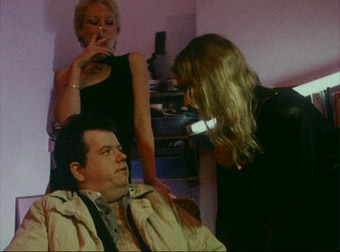
Voice Over's narrative is linear and relatively straightforward. And on a personal note, I can't tell you how glad I was about that given my reaction to Chris' earlier film Repeater. Fats Bannerman (McNeice) is a writer and radio broadcaster of 19th century fiction written in the style of Jane Austen. He lives in horribly realistic squalor after a divorce which hints at previous domestic violence and pours his soul into the creation of faux human characters that are as idealised as Fats' imagination can make them. The stark reality of human interaction in the more abrasive 20th century prise open the cracks that start to appear in Fats' own psyche not long after an interview with an aggressive journalist. Fats' success at his modest radio station is revealed to be an ironic one; his audience tune in because of (to use the vernacular) how 'lame' his work is. Kitsch is in and Fats' show is kitsch central. So while he perceives himself to be ridiculed from afar, Fats builds up a fattened chip on a shoulder that can only bear so much weight. Together with his sound man ('FX' played by John Cassady), the only character in the movie with whom Fats seems to have a real friendship, they play a media game meant to impress those assumingly genuine fans of his work but the dark seeds are already sown.
A significant drunken humiliation at the hands of two women who entice and then assault him gnaws away at Fats' own flimsy grasp of self-worth and in a rare moment of commercial reason, he introduces vampiric horror into his broadcasts as a way to pander to his newly discovered youth demographic. His ratings soar. This act of creative vandalism unwittingly foreshadowed the success of the modern literary genre, the monster mash-up that began with Seth Grahame-Smith's Regency-horror novel Pride and Prejudice and Zombies. I wonder if the author ever saw Voice Over? But the key to Fats' deterioration is McNeice. His is a powerhouse of a performance and he anchors the movie distracting you from the limitations of a budget so low, snakes could look down on it. In fact McNeice makes Fats almost sympathetic – no mean feat. We are morbidly invited to climb into his mind in the same way we'd enter a condemned building. You know it's going to collapse but you don't know when.
"...Ian had always suffered from a stammer. He would stumble over words starting with hard consonants. The weird thing was that it didn't happen on stage, once he'd learned his lines. But just before Voice Over that changed. His mother died tragically and his childhood affliction returned, big time. So what did I do for my pal? I wrote a film about a stutterer."
Fats' fame grows. The stammer starts to creep into his broadcasts and then the movie takes a darker turn with what seems like a significantly missing scene from the narrative. This superb coup de cinema sets Fats up as a potential monster and simultaneously, a potential good Samaritan – you choose. Whether this was Chris's intention or not is frankly irrelevant to an audience and in this case that's myself. The writer/director deliberately leaves out an event and lets us judge Fats' subsequent actions from very liquid foundations. It's very refreshing to see half a movie balanced on an event that you never see and never get to judge. Voice Over has now thrown off a few moorings and we witness Fats taking care of 'Bitch' (the only word she utters according to Fats) a woman who has apparently been struck dumb after a brutal beating and/or rape. Fats choses to look after her with all of his conflicting darkness and inherent sexism front and centre.
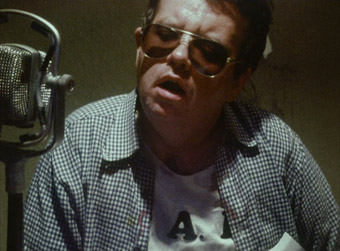
The missing scene is of course the attack on the girl and we don't know whether Fats was involved. Another more subtle touch is that the injured girl is played by one of the same actresses who humiliates Fats earlier on. For whatever reason (budget, design, an ironic nod to Luis Buñuel who once swapped actors playing one role in his That Obscure Object Of Desire), this double casting suggests Fats may have a revenge motive although tending to someone's injuries is an odd way to get back at someone. It is, of course, all about control, physical and psychological, a lifeline to Fats whose own life is blurring from the centre outwards. Because the girl is mute and mostly catatonic, Fats can imprint any character from his imagination on to this blank slate. His idealized state of womanhood is flimsy balsa to the battering ram of reality and Bitch becomes a literal cipher who has to satisfy a mind crumbling dangerously in front of her, a mind whose fear of the wonderful/terrible reality of womanhood is about to swamp him.
"What I do know, now having written literally dozens of screenplays, is that stories have a strange organic life of their own. It is often only later that you find out what you were truly writing about. More problematic, what the filmmakers 'make' and what the audience sees can be very, very different. To attempt to say what I think Voice Over is about at this distance would be at best a lie, and at worst, an apology. What I can say is that what it really represents for me is me becoming a filmmaker."
Anyone who has ever created anything will feel Chris's words strike home. There comes a moment when the work starts to tell you what it needs. Fictitious characters start imposing their will on you and when that happens, you almost bark in shock. It's a sort of quasi-artistic schizoid fracture and the best way to confront it head on is by casting yourself in your different character's guises. One of Fats' many frustrations is the withdrawn nature of the girl he appears to be helping. She's communicating so obliquely and infrequently that her very acquiescence becomes almost unbearable. With the poor girl in tow, Fats tries to adjust to the trappings of his professional success by accepting another job and buying a new cookie cutter house (who needs furnishings?). He manages to emanate squalor even in bare and fresh surroundings. This is because it's the man we're looking into and not the production design. Bitch shows signs of communication with the 'public radio performer Fats' just as his final creative act at his new radio station is a literal unraveling of his psyche. He spools out. Once speech goes, what other ways are left to truly communicate? Voice over, indeed. Or do you find ways to communicate in a more pure way once the voice is over? Purity is a very ambivalent word. Ask Hermann Goering.
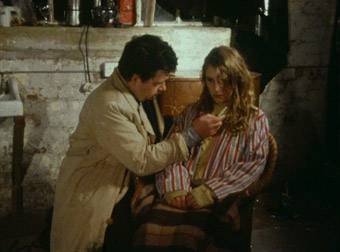
It's the movie's ending that has created the cloud of controversy that's been coldly draped over the movie since its inception and I'm not about to spoil anything (please see the movie before you read the excellent and comprehensive sleeve notes). It's odd for me to think that a film about 'x' presupposes that the filmmaker not only agrees with 'x' but is absolutely 'x' in his/her own character. This is critical dumbing down, a reductionist view of art which is frankly absurd. It's the sort of thinking that assumes David Cronenberg is a depraved, sadistic mad man, that Martin Scorsese surely has mob connections and that Steven Spielberg is just waiting at Devil's Tower for the Mothership to whisk him away. Utterly and contemptibly ludicrous.
"In 1982 I had shown Voice Over at a festival in Los Angeles. At the end of the screening I had an agent, a manager and a lawyer. It would take me almost a decade to make a film here, but I suddenly found myself in a culture that embraced me."
I was at that screening and although ten years is a long time in show business, it seems that the culture that embraced my friend's work and put him on a path that has allowed his inner filmmaker some room to manoeuvre. Say what you will about American culture but once you're really there, opportunities make themselves available and given luck, you never know what yellow brick road you may be invited to take. Given the nature of Voice Over and its darkly troubled protagonist, it's fascinating to me that Chris's latest work - he co-wrote Temple Grandin for HBO which got Best Film and Best Actress nods at the Emmys last year - features another towering central performance by Claire Danes as a troubled individual who learns how to deal positively with her affliction (autism). It's perhaps a tenuous link but it's a strong example of how filmmakers grow.
Chris says of his current situation;
"I never saw myself as becoming part of commercial cinema – if you'd told me then that I would end up in Hollywood I would probably have been appalled."
But then as Chris reminded me in 1999, movies are neither Titantic nor Blair Witch. There are thousands of gradations in between and I'm not just talking about budget. That he has folded his own sensibilities into the mainstream does nothing to decry earlier efforts or their scope and ambition. But then filmmakers have to make a living. Injecting as much of yourself into all your projects gives satisfaction and with the writing kudos on Mick Jackson's wonderfully directed Temple Grandin, Chris is off on another yellow brick road. Just keep those curtains closed.
Voice Over was shot on 80's 16mm film stock and the condition of the surviving prints and negative is certainly not pristine with a fair amount of damage, like dirt, scratches and negative sparkle. I suspect this won't be the the Blu-ray to whip out to show off your new 46 inch plasma nor should it be. I cannot comment on the Blu-ray issued with the DVD (as it was not included with the review DVD) but I suspect it's transferred from the same source materials. Presented in the original 4x3 ratio, the overall print is ever so slightly soft but nothing that calls attention to itself.
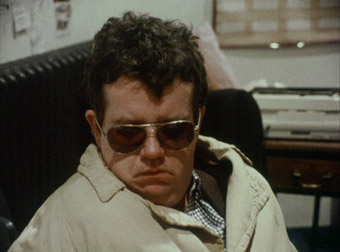
The PCM mono soundtrack is largely free from distortion and hiss and the all-important dialogue is clean. The sourced music by Schubert, presumably meant to reinforce and echo the 19th century radio drama, is slightly muffled but again, it's not something that takes you out of the film. There are subtitles included.
Repeater (1 hour, 11 minutes 26 secs)
"This isn't cinema! ... Where is, in a word, the emotion?"
I go into my first exposure to Repeater in greater detail in an accompanying article, here.
Imagine going into a supermarket. You can see all the food and household products you want to buy. All is familiar. Everything is there and your interpretation of the experience of shopping is a straightforward one. It's only when you move in close to fill your basket, you notice that every shelf is perversely defended by razor wire and multiple choice questions in Serbo-Croat. Chris was channeling the French new wave and a number of other European influences and it was a style of presentation that was so different to what I could accept that it left me despondent. Come on, I was in my late teens and two-dimensional at that age.
Don't get me wrong. I'll take full responsibility for my not getting it but a lot of the film was intended to undercut conventional narrative (or a half baked notional form of 'lying' as Roland Denning points out in the sleeve notes). Whatever the film was trying to do (and obviously succeeding well enough that it's included here on this disc) I could not tune into it. I really looked forward to a second look to see how much I'd changed. And its time travelling power was startling. It transported me straight back to that cinema seat at Chapter Arts Centre and made me feel just as belittled and uncomprehending as when I first saw it. I even emailed Slarek and bemoaned the fact that I still didn't get it.
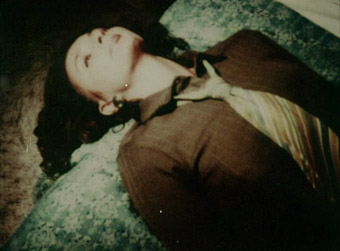
I believe I may be laying down a challenge here. See it, get it and then enlighten me. The plot is relatively simple. A girl asks to be arrested for a compassionate murder while a suspect is accused in a neighbouring interrogation room of being a hit-man. Guilt ridden, she hires him to kill her. It turns out he isn't a hit-man and gets killed for his trouble. Of course, it's not that straightforward. There are 'longeurs' as Chris likes to call them, endless yo-yo tracking shots and characters talking to the camera. It's art of a sort, just not my sort of art.
Booklet
As I mentioned earlier, don't dive into this before you've seen the film. The reviews and reminiscences make it necessary to reveal certain plot points that really need to be disclosed in the act of watching the feature. And although the booklet is illustrated, the reproduced photos are not of a high standard mainly due to the age of the materials. The odd thing is that although there are photos of Chris in all of his late twenties' glory, they're all out of focus, too dark or completely obscured. I suppose this lends him an air of mystery, not a bad thing. The amount of material written about Chris' work would be heartening for any artist. Amy Simmons covers Chris' earlier oeuvre. The feminist statement which caused all the furore is reproduced and is very interesting in that whoever wrote it had already made up their mind what Chris' film was about and set it in stone. That's like arguing with a fundamentalist who has already accepted that a god exists before the debate on his/her's existence has started. Amazing that people can do that and still retain a straight face.
Steve Jenkins' original Monthly Film Bulletin review of Voice Over is reprinted as well as Chris' lengthy, entertaining and revealing look back at the start of his career. Roland Denning (camera person) and Ian McNeice (star) both share their memories of the shooting with an emphasis on the formation of the Chapter Film Workshop from Roland. There's biographical info on Chris and Ian as well as a word about the transfers.
I wish all movies were treated with this much care and respect. Well, perhaps not The Celestine Prophecy.
Voice Over is a bold, ambitious feature that challenges notions of gender, defies certain comfortable narrative tropes and headlines a powerful performance by Ian McNeice. Its maker sees it as his first step as a storyteller. Walk on. It's intelligent, dark and cheap (there's no getting around that) but in the end, did I engage? Oh yes. And that, for me, is really the most important yardstick. For those with more challenging tastes, Voice Over comes highly recommended.
|